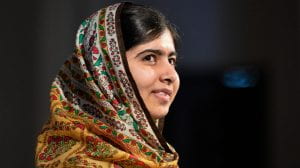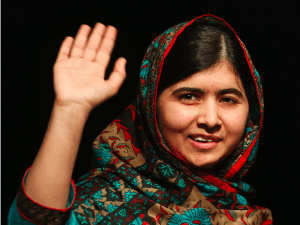Welcome, visitors of the Malala Yousafzai Learning Center. I hope you have an enjoyable time learning about my life and eminence.
Malala Yousafzai Learning Center
Bibliography
Alexander, K, L. (2020) Biography: Malala Yousafzai. Women’s History. https://www.womenshistory.org/education-resources/biographies/malala-yousafzai.
Boko Haram. (2021). In Wikipedia. Retrieved from https://en.wikipedia.org/wiki/Boko_Haram.
Golgowski, N. (2021). Malala Yousafzai Reveals She Got Married With Stunning Wedding Photos. Huffpost. https://www.huffpost.com/entry/malala-yousafzai-marries-asser_l_618acd8fe4b0ad6f5889a0e7.
He Named Me Malala. (2021). In Wikipedia. Retrieved from https://en.wikipedia.org/wiki/He_Named_Me_Malala.
I Am Malala. (2021). In Wikipedia. Retrieved from https://en.wikipedia.org/wiki/I_Am_Malala.
Kugelman, M. (2017.) Why Pakistan Hates Malala. Foreign Policy. https://foreignpolicy.com/2017/08/15/why-pakistan-hates-malala/.
Malala Fund. (2021). In Wikipedia. Retrieved from https://en.wikipedia.org/wiki/Malala_Fund.
Malala Fund. (2021). Malala’s Story. https://malala.org/malalas-story?sc=header.
Malala Fund. (2021). Working for a world where all girls can learn and lead. Malala. https://malala.org/.
This is the website of Malala’s organization, the Malala Fund, and it has very valuable information such as statistics of the number of girls out of school and insight into Malala’s life. I also used a quote I saw on it as inspiration for my eminence paragraphs: “I tell my story not because it is unique, but because it is the story of many girls.”
Malala Yousafzai. (2021). In Wikipedia. Retrieved from https://en.wikipedia.org/wiki/Malala_Yousafzai.
I used this source as a basis for most of my research. I picked out the most relevant and interesting information I saw and used it as a guide for other areas I wanted to research. I mostly used this article to find the events used in my Timeline and Achievements tabs. I also used some of the information from the article to write more detailed parts of my Learning Center, such as Malala’s nomination for the Children’s Peace Prize. For the areas I wanted more information in, I researched them specifically.
Rucker, P. (2013). Malala Yousafzai meets with the Obamas in the Oval Office. The Washington Post. https://www.washingtonpost.com/news/post-politics/wp/2013/10/11/malala-yousafzai-meets-with-the-obamas-in-the-oval-office/.
The Nobel Prize. (2021). Malala Yousafzai – Biographical. https://www.nobelprize.org/prizes/peace/2014/yousafzai/biographical/.
Yousafzai, M & Lamb, C. (2013). I Am Malala. Little, Brown and Company.
I read Malala’s Autobiography so I could get an insightful, in-depth, look at Malala’s story. I did not use any information I read directly from the book on my Learning Center other than the date Malala woke up from her coma, but the book was very useful for gaining an understanding of Malala’s country, religion, life, and activism.
Yousafzai, M. (2013). Malala Yousafzai: 16th birthday speech at the United Nations. Malala. https://malala.org/newsroom/archive/malala-un-speech.
Yousafzai, M. (2014). Malala Yousafzai: Nobel Peace Prize acceptance speech. Malala. https://malala.org/newsroom/archive/malala-nobel-speech.
I read Malala’s Nobel Peace Prize acceptance speech here and it gave me valuable insight into what Malala’s specific views are about children’s rights and education, and what developed countries and governments should be doing to help. I used this information to help write my eminence paragraphs. One of the big takeaways was her talking about how guns, tanks and war seem to be so easy to get but books, schools and peace are not and how developed countries have a responsibility to help the developing ones.


